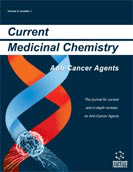Abstract
Pharmacogenetics focuses on intersubjects variation in therapeutic drug effects and toxicity depending on genetic polymorphisms. This is particularly interesting in oncology since anticancer drugs usually have a narrow margin of safety. Irinotecan {7-ethyl-10-[4-(1- piperidino)-1-piperidino]carbonyloxycamptothecin} is used in cancer chemotherapy as a topoisomerase I inhibitor and it is characterised by a sometimes unpredictable severe toxicity. It is mostly intestinal with nausea, vomit and diarrhoea or haematologic with leukothrombocytopenia. Its complex metabolism involves many proteins. Human carboxylesterase isoforms 1 and 2 (hCE1, hCE2) activate irinotecan to its metabolite SN-38 (7-ethyl-10-hydroxycamptothecin), cytochrome P450 isoforms 3A4 and 3A5 (CYP3A4, CYP3A5) mediate the oxidation of the parental compound to irinotecan, uridino-glucuronosil transferase isoform 1A1 (UGT1A1) catalyses glucuronidation of SN-38, the multiresistance protein isoform 2 (MRP2) allows the cellular excretion of the SN-38 glucuronide (SN-38G) and the multi-drug resistance gene (MDR1), encoding for P-glycoprotein, is responsible for the excretion of irinotecan from the cell. Polymorphic structures in the genes encoding for all these proteins have been described. In particular, the UGT1A1*28 allele has been associated with an increased toxicity after irinotecan chemotherapy. Classical parameters used in the clinic, such as body-surface area, have no longer a meaningful correlation with clinical outcome. Hence it emerges the importance of studying the individual genotype to predict the toxicity and efficacy of irinotecan and to individualise therapy. In this review, we summarise the new developments on the study of the pharmacogenetics of irinotecan, stressing its importance in drug cytotoxic effect.
Keywords: pharmacogenetics, irinotecan, ugt1a1, cyp3a4, hce, mrp2, mdr1 polymorphisms
 1
1

















